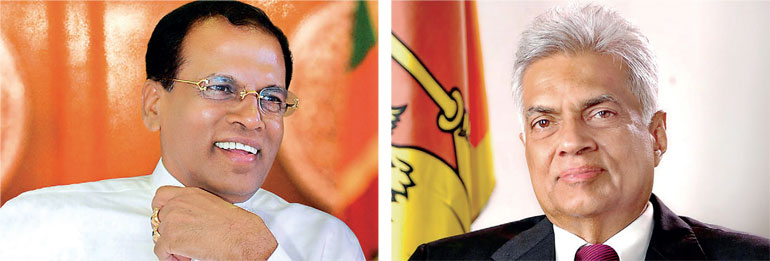Friday Feb 13, 2026
Friday Feb 13, 2026
Wednesday, 28 December 2016 09:06 - - {{hitsCtrl.values.hits}}

 Understanding in some sense is always retrospective. The past two were years of hope for good governance. This essay is an attempt to be more in touch with reality.
Understanding in some sense is always retrospective. The past two were years of hope for good governance. This essay is an attempt to be more in touch with reality.
“Millions were spent to get down a horse from Queen Elizabeth’s stables. It was taken to Nuwara Eliya. The prince goes to Nuwara Eliya by helicopter to ride the ‘Buckingham’ horse. He comes back to Colombo in the chopper in the evening. However, youths in our villages have to wait looking at the future. Do we allow this dictatorship to continue?” asked the common candidate at Panduwasnuwara on 14 December 2014 (https://www.youtube.com/watch?v=AQW9khV56Vg).
Thanks to the internet, it is possible for us to recall and relive the passion and the indignation of the common candidate expressed in 2014 in all its spotless accuracy from digital archives available on the internet.
The ostrich’s approach
In a recent address to the Judicial Services Association, President Sirisena said that he was the person who earned most censure from websites. No one else could come close. He had totally given up scanning websites and advised even his family members to ignore them.
All politicians including presidents are human beings first. His instinctive reaction to web contents though flawed is unsurprising. That said, the ostrich’s approach is appallingly stupid. In politics, lack of objectivity can be a deadly sin. Confusing statements of fact with statements of value is a mistake. In the age of information we need to be reconciled to a world of volatile politics.
Ours is also an age of acceleration. Its momentum is fuelled by advances in communication technology. The internet can inform and misinform. It can make the dumb dumber and the informed better informed. The internet has outflanked the mainstream media.
The mainstream media did not report how the self-proclaimed hero of Nandikadal manhandled a 16-year-old student who was about to enter the examination hall to sit for his O/Levels. The websites reported the incident.
Mainstream print and electronic media reported in great and grand detail how the President and Prime Minister felicitated a Buddhist monk celebrating his 74th birthday, diminishing the Buddhist doctrine of transient, evanescent, inconstant, impermanence. The websites ignored it. Rightly so.
Mass communication is no longer the preserve of media owners. The flow of information is not subject to the discretion of traditional gatekeepers. The proliferation of sources of information has empowered the citizens to select sources of information they trust. If citizens opt to follow a website that the President has decided to ignore, it is just too bad for the President.
Time for clarity and precision
It is time for clarity and precision. President Maithripala Sirisena and Prime Minister Ranil Wickremesinghe have positively and conclusively succeeded in forfeiting the trust and respect of those who voted for change on 8 January 2015. The country is in a state of protracted flux.
The signs appeared early. The man who promised an end to nepotism appointed his brother to the top job in Telecom. It was not all that bad. There was yet, plenty of hope. He had many brothers and only one was chosen. Revolutions don’t come cheap. Okay. Every Fidel needs a Raul.
Then something else followed. The restoration of rejects to Parliament determined the trajectory of the new order. Capture of the political base of the common candidate was the priority. It removed whatever hopes the public had for a government that observed ethical propriety.
The alleged bond scam undermined the promised integrity in governance. The resignation of the Director General of the Commission investigating Bribery and Corruption undermined public confidence in the Government’s ability to fight corruption – a key campaign pledge. These deliberate detours underscored the Government’s indifference to public opinion and contempt for due process.
The third year in office commences with strong evidence of intolerance for dissent. The regime consistently evades accountability. It avoids explanations for its conduct. The Prime Minister makes policy statements but refuses to debate issues. His strategy of trivialising the opposite view earns him enthusiastic table thumping from his backbenchers. Cheap applause and the praise of underlings! To the vast majority in the country, he remains a stand offish leader removed from reality.
The President adopts a different style. Philosophising even the most mundane comes naturally to him. His homilies invariably begin with a ritual request for sufferance of his dispensed wisdom. “Venerated and sacred Maha Sangha, permit me…”
Our Buddhist monks are masters of statecraft. In the business of devotion and piety they practice free market principles of competition. They know that the President is engaged in a battle of wits with his predecessor for control of the SLFP – the party that epitomises Sinhala Buddhist quintessence according to conventional wisdom.
Many ways to deceive people
There are many ways to deceive other people. An outright lie is the simplest. It is also possible to deceive by avoiding the truth. Obfuscating or exaggerating the truth are equally effective. The most damning is casting doubt on the truth. Reports on investigations and court proceedings offer more than adequate evidence to illustrate the collusion between hound and hare.
Trust in and respect for the political process is vital for a credible democracy. The proposed constitutional reforms will not be endorsed by an electorate that is deeply sceptical of its authors. Good governance is not an abstract principle but a practice. The President’s and the Prime Minister’s lectures and sermons are no substitute for ethical governance.
Regional economic integration makes eminent common sense. Yet, we cannot make Sri Lanka another Singapore. Unburdened by a manufactured history Singapore has leveraged its geography. Singapore has no Maha Nayakes and Anu Nayakes advising on policy.
Ahilan Kadirgamar, political economist and member of the Collective for Economic Democratisation in Sri Lanka, captures the current stalemate.
“With the ETCA debate polarised between the free trade elite and the anti-Indian forces, there has been little informed debate including critical analysis of trade liberalisation, broader neoliberal reforms and the deteriorating global economic situation. For those bothered by xenophobia and economic marginalisation, the challenge is to oppose both the reflexive anti-Indian campaign of the nationalists and the neoliberal policies of the liberalisers.”
Double standards
In the past two years, we have witnessed far too many instances of double standards in both decision making and policy implementation. A recent new report has Nimal Bopage, Secretary Ministry of අParliamentary Reforms and Mass Media, declaring to the media: “I have been told to sign or resign not as a threat but as a matter of course. The Prime Minister is a good statesman. What he said was correct; as my duty is to sign a document which has been approved by the Cabinet – and if I fail to do so I should resign.’
The statement of this public servant is symptomatic of a rudderless government. The Secretary of the Ministry of Mass Media wants us to believe that that the Prime Minster is a good statesman and he, an equally good public officer. In this country people in high office do not resign. They resign themselves to whatever new situation that emerges after throwing the dice. Making governance a circus and himself its leading Bozo is his prerogative.
A sceptical public now refuse to swallow stories of profligacy by the predecessors and are convinced that the successors are no better. The failure of the Prime Minister’s technocrats to engage with people’s concerns has compounded popular resentment.
The previous regime brilliantly introduced the idea of ‘Ranaviru’ in to the collective unconscious of the Sinhala mind. Yet, it remained an inexplicit idea. President Sirisena in October 2016 made it an explicit idea.
Government has failed
This Government has failed. Speed is essential for meaningful reform. If reforms do not follow immediately after change, the movement loses its momentum. The change of 8 January 2015 failed to dislodge the entrenched elite. All they needed was a small window of opportunity to hijack the movement for reform by raising concerns of national security.
People who yearned for good governance now demand it. The demand is directed to a regime that has reneged on its promise. The political success of a reform movement pivots on the consistency with which it correlates vision with process. Proof of the pudding is transparency of process.